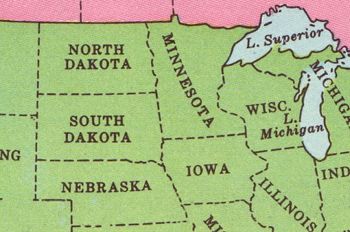Wisconsin (U.S. state): Difference between revisions
imported>Yi Zhe Wu |
mNo edit summary |
||
| (10 intermediate revisions by 5 users not shown) | |||
| Line 1: | Line 1: | ||
{{subpages}} | {{subpages}} | ||
'''Wisconsin''' | {{dambigbox|Wisconsin (U.S. state)|Wisconsin}} | ||
[[Image:North mid west.jpg|right|350px]] | |||
'''Wisconsin''' is state of the [[United States of America|U.S.A.]] in the upper Midwest; its area is 65,498 square miles (169,639 km²) and its estimated population is 5,627,967 (2008). Since its admission to the Union on May 29, 1848 as 30th state, Wisconsin has been ethnically heterogeneous, with [[Yankee]]s being among the first to arrive from [[New York (disambiguation)|New York]] and [[New England]]. They dominated the state's heavy industry, finance, politics and education. Large numbers of European immigrants followed them, including [[German]]s, mostly between 1850 and 1900, Scandinavians (the largest group being [[Norwegian]]) and smaller groups of [[Belgian]]s, [[Dutch]], [[Swiss]], [[Finn]]s, Irish and others; in the 20th century, large numbers of [[Pole]]s and [[African American]]s came, settling mainly in [[Milwaukee]]. | |||
The capital of Wisconsin is [[Madison]]. | |||
==Politics== | ==Politics== | ||
In history, the state of Wisconsin was on the forefront of the [[Progressive Movement]], and produced legendary Progressive figures such as [[Robert M. La Follette]]. | In history, the state of Wisconsin was on the forefront of the [[Progressive Movement]], and produced legendary Progressive figures such as [[Robert M. La Follette]]. | ||
The governor is the chief executive of the state, and currently the post is held by [[ | The governor is the chief executive of the state, and currently the post is held by [[Scott Walker]], a Republican. The legislative branch is bicameral and is divided into the State Senate and the State Assembly. Nationally, [[Herb Kohl]] and [[Ron Johnson]] represent the state in the [[U.S. Senate]]. | ||
==Education== | ==Education== | ||
| Line 12: | Line 15: | ||
The [[University of Wisconsin-Madison]] is one of the top public research universities in the United States. [[Charles Van Hise]], once the president of the university, formulated the philosophy referred to as the "Wisconsin Idea", which is that the benefit of education from the university should have a positive impact on everyone in the state.<ref> [http://www.wisconsinidea.wisc.edu/history.html History of the Wisconsin Idea] </ref> | The [[University of Wisconsin-Madison]] is one of the top public research universities in the United States. [[Charles Van Hise]], once the president of the university, formulated the philosophy referred to as the "Wisconsin Idea", which is that the benefit of education from the university should have a positive impact on everyone in the state.<ref> [http://www.wisconsinidea.wisc.edu/history.html History of the Wisconsin Idea] </ref> | ||
The state ranks the 8th among the 50 states in the United States in educational quality in 2006-2007, according to the "Smartest State" rankings compiled by the Morgan Quitno Press.<ref> [http://www.morganquitno.com/edrank.htm 2006-2007 Smartest State Award], Morgan Quitno Press </ref> | |||
== | ==See also== | ||
[[United States of America/Catalogs/States and Territories|U.S. States and Territories]] | |||
==References== | ==References== | ||
<references/> | <references> | ||
</references> | |||
[[Category:Suggestion Bot Tag]] | |||
Latest revision as of 17:00, 8 November 2024
Wisconsin is state of the U.S.A. in the upper Midwest; its area is 65,498 square miles (169,639 km²) and its estimated population is 5,627,967 (2008). Since its admission to the Union on May 29, 1848 as 30th state, Wisconsin has been ethnically heterogeneous, with Yankees being among the first to arrive from New York and New England. They dominated the state's heavy industry, finance, politics and education. Large numbers of European immigrants followed them, including Germans, mostly between 1850 and 1900, Scandinavians (the largest group being Norwegian) and smaller groups of Belgians, Dutch, Swiss, Finns, Irish and others; in the 20th century, large numbers of Poles and African Americans came, settling mainly in Milwaukee.
The capital of Wisconsin is Madison.
Politics
In history, the state of Wisconsin was on the forefront of the Progressive Movement, and produced legendary Progressive figures such as Robert M. La Follette.
The governor is the chief executive of the state, and currently the post is held by Scott Walker, a Republican. The legislative branch is bicameral and is divided into the State Senate and the State Assembly. Nationally, Herb Kohl and Ron Johnson represent the state in the U.S. Senate.
Education
The University of Wisconsin-Madison is one of the top public research universities in the United States. Charles Van Hise, once the president of the university, formulated the philosophy referred to as the "Wisconsin Idea", which is that the benefit of education from the university should have a positive impact on everyone in the state.[1]
The state ranks the 8th among the 50 states in the United States in educational quality in 2006-2007, according to the "Smartest State" rankings compiled by the Morgan Quitno Press.[2]
See also
References
- ↑ History of the Wisconsin Idea
- ↑ 2006-2007 Smartest State Award, Morgan Quitno Press
